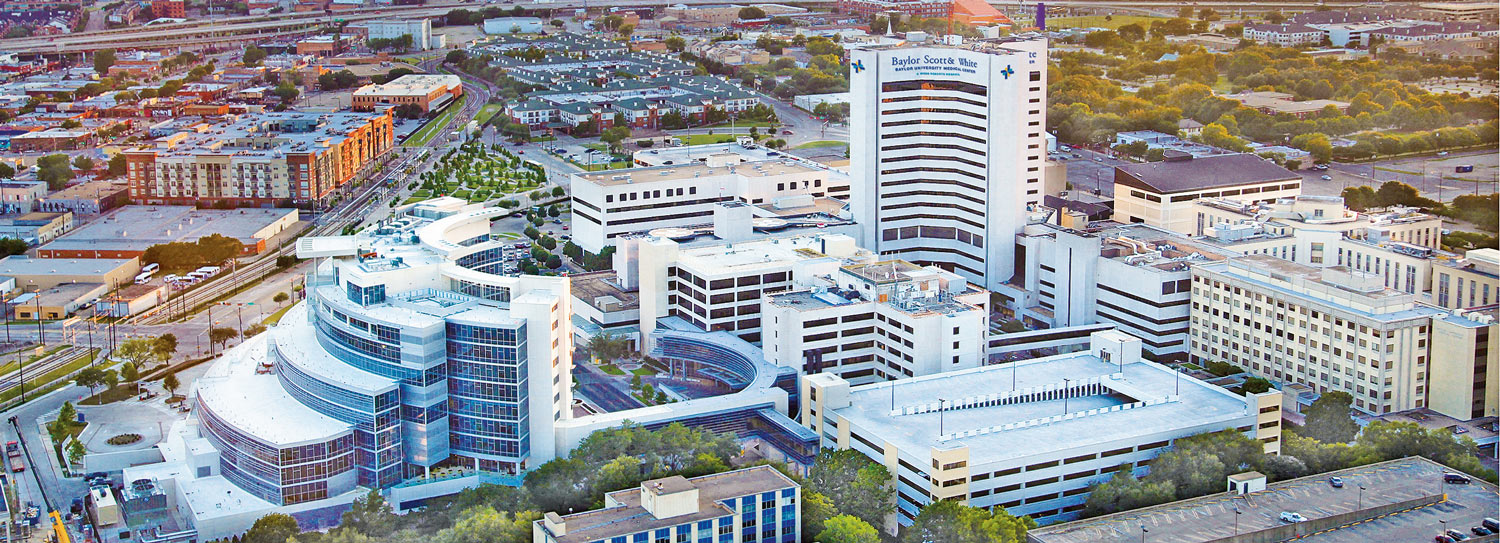Baylor University Medical Center is one of the major enrollment centers for two national clinical trials that could impact the field of lung transplantation. Both studies are looking at ways to treat early and established chronic rejection after lung transplant
“A select number of successful programs in the country were asked to be enrollment centers for these trials,” says Todd Grazia, MD, chief of transplant pulmonology at Baylor University Medical Center. “Programs generally had to have good quality, a significant patient volume and extensive clinical research experience.”
BOSTON-1 is a Phase III randomized, controlled clinical trial to demonstrate the effectiveness and safety of an inhaled form of cyclosporine in patients experiencing chronic rejection after single-lung transplant. BOSTON-2 is a Phase III randomized, controlled clinical trial that will evaluate the impact of inhaled cyclosporine in patients with early and established chronic rejection after double-lung transplant. Baylor University Medical Center is serving as one of only two enrollment centers in the state of Texas.
Baylor University Medical Center is also one of only two major enrollment centers in Texas for a Medicare-sponsored ECP Registry. The primary aim of the study, Extracorporeal Photopheresis for Medicare Recipients of Lung Allografts, is to determine the efficacy and tolerability of extracorporeal photopheresis for treating early chronic rejection, as well as patients with established chronic rejection refractory to other treatments. All three studies are administered through Baylor Scott & White Research Institute, the research and development arm of Baylor Scott & White Health.
“The COVID-19 pandemic has slowed some research efforts in advanced lung disease because some of the tests required to enroll patients, such as pulmonary function testing, are aerosolizing procedures,” Dr. Grazia says. “Nonetheless, these endeavors will continue, and we have multiple ongoing trials and research studies, including pharmaceutical and biologics industry-directed trials, translational clinical research studies, and institutional-based clinical and translational research studies. We are investigating important questions related to immune suppression, infection, lung rejection, lung fibrosis, the genetics of lung disease, new potential pulmonary hypertension treatments and asthma therapies, amongst others.
With the health and safety of patients, including research participants, a top priority, Baylor Scott & White Health has implemented new preventive measures and innovative offerings designed to protect patients. These include COVID-19 testing of patients as deemed appropriate, virtual care options to minimize one-on-one interaction, masking of patients and staff, and enhanced cleaning and touch-free protocols.
Dr. Grazia says he and his colleagues in the Baylor University Medical Center Advanced Lung Disease Center Interstitial Lung Disease (ILD) Program are working together closely to evaluate the effect of immune-suppressant therapies used to treat ILD patients post-lung transplantation. Many of the new biologic immune modulatory medications have significant long-lasting effects that could possibly increase the risk of infection and other complications at the time of transplant, as well as the potential to reduce the risk of certain immune-mediated complications such as antibody-mediated rejection.
“The impact of these drugs has not been assessed before,” Dr. Grazia says. “We want to know if there is an increase in infection after lung transplant in patients who have been on these drugs for ILD. Conversely, is there some benefit to these types of drugs? These drugs may inhibit some types of rejection. Our research is focused on understanding the impact of newer potent immune suppressants and biologics at the intersection between end-stage lung disease and transplant.”
One innovation Dr. Grazia has brought to Baylor University Medical Center, in conjunction with the Department of Thoracic Surgery and Lung Transplantation, is re-transplantation. Typically, these include younger patients, commonly less than 60 years of age, with cystic fibrosis or other indications for a first lung transplant at an early age who are now faced with a failing transplant.
“We are very careful about whom we put on the list for re-transplant,” he says. “We are currently evaluating two to three patients. These patients are a bigger challenge, but when carefully selected generally have good outcomes. These patients may have done very well for quite a while, and we don’t want this to be the end of their journey.”
The Advanced Lung Disease Program, in collaboration with the Department of Thoracic Surgery, plans to build an interventional pulmonology program that will focus on advanced therapies for patients with end-stage lung disease. Procedures such as lung volume reduction surgery – both endoscopic and surgical – can give patients more quality of life and more time before needing a transplant.
“There is great collaboration among all the physicians in our department,” he says. “We are adding a number of skilled and experienced physicians who will allow us to make deep inroads into research. We want to look at the newest things that are currently available and in the pipeline that affect how we do transplants and take care of patients in the most effective way possible.”



